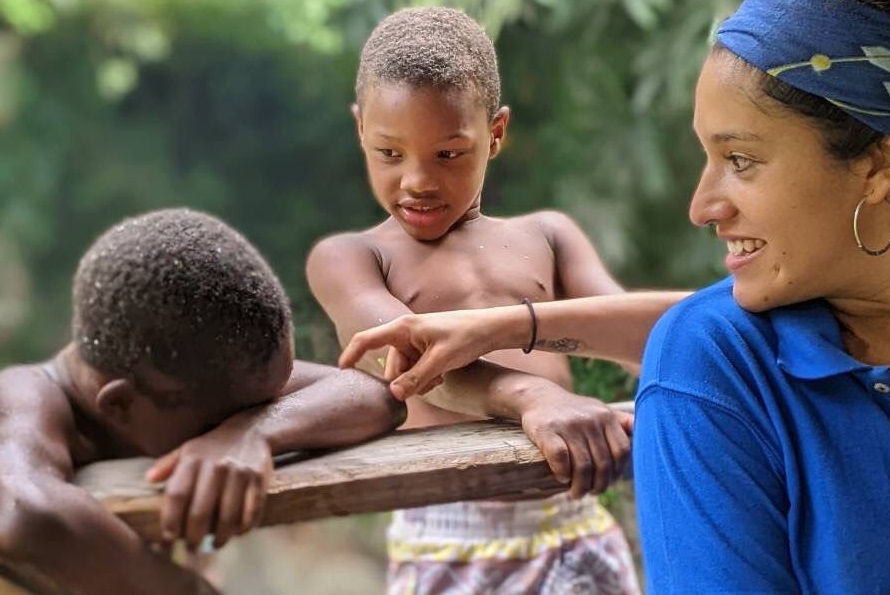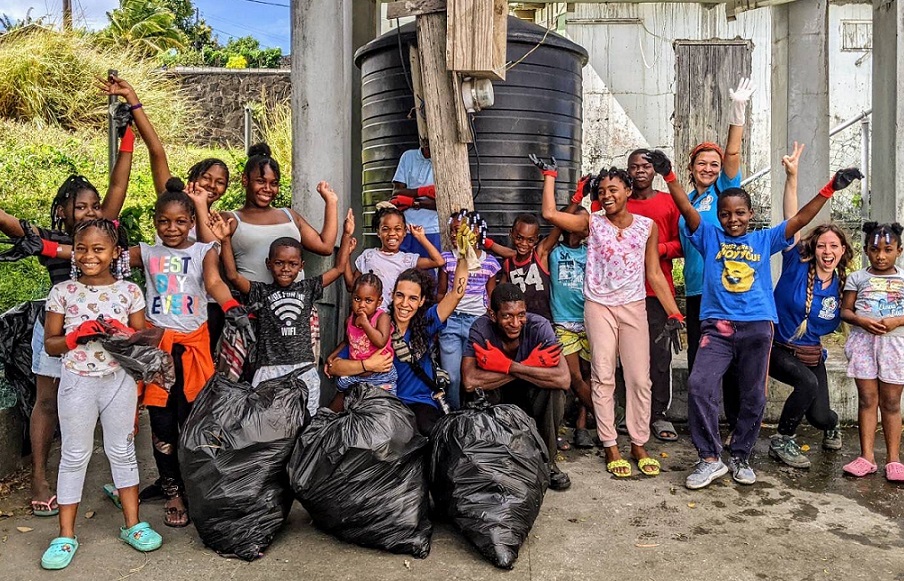What does it mean to be a volunteer?
By Agustina Bastias, CICD Climate Activist at Richmond Vale Academy in St Vincent & the Grenadines
Community work, a challenging journey of mutual development
These last weeks we started to work with the communities… yes, finally. Even when we have had a really good time helping with the restoration of RVA during our first month and building more confidence and team spirit during that process, we were looking forward to go out to the communities and explore deeper the Vincentian culture.
The two activities we just did with the communities were related with clean ups, but also with the beautification of a river area through the construction of terraces to plant herbs. We also visited a farmer’s club composed only by women, who invited us to restore the school garden of the community. From these three activities I started once again to think about my role as volunteer and the impact we have in the communities, not related with our tasks but more with our attitude and expectations.
Some thoughts about our role as volunteers
On one side, I realised how important it is to show the community how we as volunteers can help them to improve the conditions or access to goods if we work together. The local people have known a lot of volunteers during the time that RVA has been working in St. Vincent, but nevertheless, the exchange did not always accomplish their expectations. For instance, there are volunteers that stay on the island for a short period, or they are just passive or too laid back to work. So, the result of the project is very weak and not so meaningful for the community. The volunteers that come after then need to make a bigger effort to gain the locals’ confidence to build a collaborative alliance. In this sense, we also carry a weight on our backs due to the bridge that we are creating with the communities we are working with. The result of our alliance will be the starting point for the next teams in terms of availability, trust and reciprocity from the local people.
Likewise, in both clean ups (with different communities) I felt like they were testing our participation in order to check if they can trust on us to carry out more activities. Like: if our activity makes a difference or not for them, if we were available to spend some time with them, if we were working with them or for them, among others. You could see that from the number of participants, in their openness and availability. That is a difficult position for us to be in, but also understandable. You want to show yourself available to work with them, but at the same time you want to encourage people not to rely on you as if you are showing something that they cannot do by themselves. Meaning, you want to work with them to improve a condition, but this doesn’t mean that they could not achieve it without you.

Working shoulder to shoulder – not being “heroes”!
With this, comes again the reflection about the “hero position” that I found myself in when I went to Zambia and how uncomfortable I felt about it. As volunteers we can fit into a role related with a kind of “cultural supremacy”, as if your ideas are more valuable based on the colour of your skin. Or you just end up establishing a new way of doing things because you think you know better, without the collaborative work with the beneficiaries who may underestimate their own capacity to offer you something to learn from.
This is something that I personally think needs to be raised in our training as Climate Activists, so we can question ourselves: What we want to accomplish as volunteers? Not only doing activities or helping the communities to improve something. But also as individuals, as human beings - what do I want to get from this experience? In which way will this experience will fulfill me? Because it is not a sin to search for this kind of activity to reach some personal goal while you work with others for them to achieve it too. The personal impact that the experience will give you is essential when we talk about motivation. And that is why I think the preparation period is so important, when you can heal yourself in many aspect through discussion and self-reflection, sharing spaces with people from different backgrounds and life experiences. Then we can be ready to challenge ourselves and our preconceptions and work as a partners with the local people.
However, we can also find another side – such as the Farmers Club I mentioned before. This Farmers Club is a group of women that were supported by RVA in the construction of home gardens in the past. A project that was guided by Danail, a project leader from RVA. In our first contact with this group we felt very welcome and they immediately thought about us to help them restoring the school garden. We understood afterwards that they had this “testing time” in the past with other volunteers and this project leader, who made an incredible job building home gardens and, due to that, establishing food security for the families of the communities and empowering them on the way. This settled the base for other teams, including ours, that came after them to work with this community which really believes that working shoulder to shoulder, we can fulfill our mutual expectations and develop a project that benefits the whole community.
Learning by doing, restoring the plantation and kitchen garden
Finally, I would like to add another highlight related with the skills that we are acquiring during our stay at RVA - without even noticing. During the months that we have been at the school we participated in a lot of activities related with the restoration of common spaces, the plantation fields and the kitchen garden. With every activity that we do, we develop new skills and enrich our previous knowledge. Personally, I feel that my knowledge about agriculture is growing every day, but I only noticed this when I faced a challenge like the one we had last weekend. We had the task to improve the surroundings of a river by removing garbage and incorporating herbs and flowers. One part of the land was very steep, so we came up with a design of terraces made from bamboo to provide water retention and beautification of the place. We thought about this material because this is what is used at the school to build beds in the garden. So it was natural to think about that resource when we can see it growing here in every forest.

Absorbing the new learning like sponges!
Even if we had helped to build these beds, we had never done it by ourselves. However, it looked like we always had it inside us. Once that we started to cut the materials and remove the weeds, everything worked out in an organic way and we built these beautiful terraces in one morning. During the process we were very focused in what we were making, so only at the end we appreciated our work and we felt happily shocked of what we accomplished by only have learned this technique some weeks ago.
These experiences have totally encouraged us to continue learning and to be like sponges, absorbing everything this place has to offer us. Either in our role as volunteers, challenging ourselves to deconstruct our stereotypes and expectations; or in learning by doing by the hand of RVA and the local communities, building a relationship based on reciprocity and collaboration. In the end, that’s what life is about; learning from each other in an endless process of reconstruction.





